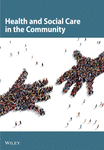Informal care and terminal illness
Abstract
This paper is based on a study of the care and services received by people in the year before death in one Yorkshire health authority. In the spring of 1997 in-depth interviews were carried out with bereaved relatives and carers of a weighted sample of 33 people who had died in one Yorkshire health authority in the previous 18 months. Deaths where people were judged to have needed no input from palliative care services were excluded. The sample covers a range of different caring arrangements, experiences of caring for someone who is dying, support from formal services, place and manner of death. All those interviewed were providing some form of informal care or support to those who died, in some cases 24-h care. The interviews provided a valuable insight into ordinary people’s experiences of death and of caring for someone who is dying. Most importantly for the purposes of this study, they gave insight into their experiences of services to support both the dying person and themselves in their caring role. The paper discusses the ways in which care of the terminally ill is distinctive. It explores the role of informal care in relation to the wider character and history of the local community, in particular the significance of its declining industrial base, and secondly, the availability of appropriate services to support those caring for the terminally ill. Finally, it makes recommendations about service planning and delivery which challenge the current framework for providing services to the terminally ill.




